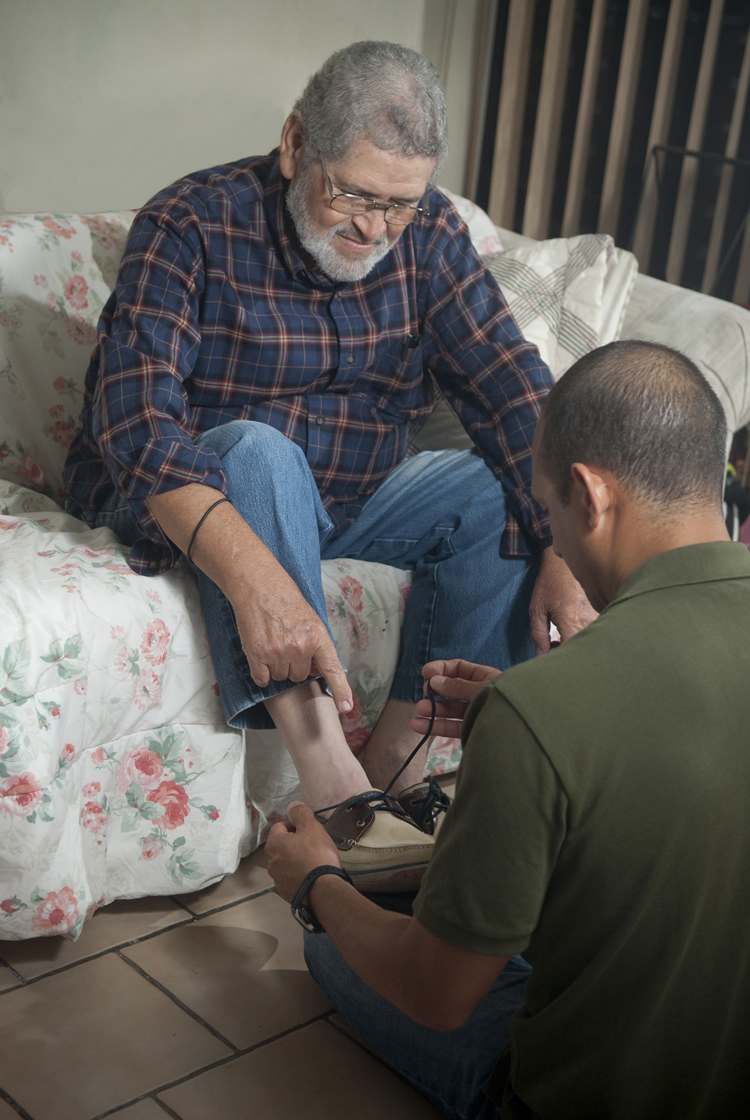Bathing, Dressing, and Grooming with Dementia


Over time, persons with dementia may begin to experience difficulties completing basic activities of daily living by themselves. These activities can include eating, bathing, dressing, and grooming. Keep in mind the following information related to bathing, dressing, and grooming.
Bathing with Dementia
Bathing is often a difficult activity for caregivers and persons with dementia because it is such an intimate experience. A person with dementia may show their discomfort or distress by screaming, crying, resisting or hitting. Perhaps your loved one doesn’t remember why bathing is important or they don’t have the patience needed to complete the unpleasant parts of the task, such as lack of modesty, being cold or experiencing discomfort.
Other reasons a person with dementia may have problems with bathing include:
- Temperature of the water or bathroom: too hot or too cold
- Forgetting that he or she needs to take a shower or bath
- Not having enough privacy or feeling embarrassed to need help
- Fear of falling
- Being rushed or taking too long
- Inability to stay focused long enough to complete shower
At some point the caregiver may need to assist the person with dementia with bathing. Here are some tips to assist your loved one:
- Prepare the bathroom first: gather all supplies, such as towels, washcloths, shampoo, soap, etc. first so that you and the person with dementia can focus on bathing. Make sure the water is not too hot or too cold.
- Make the bathroom and bathtub/shower safe using handrails, non-skid shower mats, tub bench or chair, and safe water temperature. At this point, you should not leave your loved one alone in the bathroom.
- Help the person feel in control by involving them in each step of bathing.
- Always respect your loved one’s dignity and allow them to remain covered if they prefer. Letting the person hold a towel in front of his/her body may help with anxiety.
- It may not be necessary for a full bath or shower every day. A “sponge-bath” using wet wash clothes or wipes can be effective between bathing times.
- Be gentle on your loved one’s skin. Elderly skin can be delicate and sensitive. Avoid scrubbing or rubbing, and pat them dry instead. Applying moisturizing lotion after baths can help protect the skin from getting too dry.
Recommendations to Make Bathing Easier
Some recommendations to make bathing easier include:
- Use the same routine every day and know the person’s preferences
- Have everything ready before bath/shower time
- Do not force the person to bathe
- Give simple instructions and never rush the person
- Put a towel over the person shoulders for warmth and modesty
- Encourage person to wash self, assisting only when necessary
- Use tear free or tangle free bath soap and shampoo
Dressing and Grooming with Dementia 
Persons with dementia may have problems with dressing and grooming due to the following reasons:
- Loss of understanding of how to get dressed, comb hair, brush teeth (oral care is discussed further in this section), etc.
- Forgetting why dressing and grooming are necessary
- Inability to recognize parts of the body
- Room temperature being too hot or too cold
- Distractions from people, noise, or clutter in room
- Lack of privacy
- Poor lighting
Recommendations to Make Dressing and Grooming Easier
Some recommendation to make the process of dressing and grooming easier include:
- Follow the same routine each day
- Encourage your loved one to sit while dressing and to do as much of the dressing and grooming as possible
- Allow enough time and make sure there is privacy
- Give verbal and visual cues
- Use a “mime” technique and visually demonstrate
- Place matching outfits together
- Label closets and drawers
- Lay out clothes and grooming supplies in the order they are to be used
- Use simple garments (elastic waistbands, slip-on shoes)
- Keep choices simple and use short simple instructions
- Try distracting the person if there is resistance
Additional Resources 
VA Resources 
US Department of Veterans Affairs
VA values your commitment as a partner in our pledge to care for those who have "borne the battle." We have several support and service options designed with you in mind. The programs are available both in and out of your home to help you care for yourself and the Veteran you love.
- Caregiver Support Network
- VA Caregiver Support Line: 1-855-260-3274
Geriatrics and Extended Care Services (GEC) is committed to optimizing the health and well-being of Veterans with multiple chronic conditions, life-limiting illness, frailty or disability associated with chronic disease, agining or injury. This VA site reviews information on delirium, dementia and Alzheimer's care, decision making, home and community based services, and advance care planning, among many other important topics that may be important for you as a caregiver.
Veteran's Crisis Line Phone: 1-800-273-8255 (Veterans Press 1)
The VA does not endorse the following resources or guarantee that their information is 100% accurate. However, you may be able to find some helpful information by visiting the following pages:
Alzheimer’s Association
Personal Care: Assisting a Person with Middle-or Late-Stage Dementia with Daily Needs
References: Information adapted from Alzheimer’s Association
If you have any questions or concerns, contact Dementia Caregiver Web Support.



















